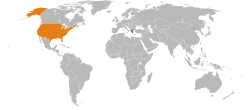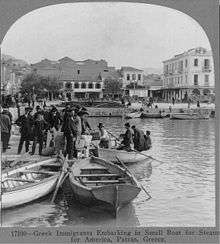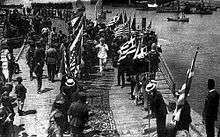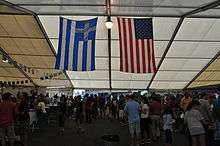Greece–United States relations
 | |
Greece |
United States |
|---|---|
| Diplomatic Mission | |
| Greek Embassy, Washington, D.C. | United States Embassy, Athens |
| Envoy | |
| Ambassador Haris Lalacos | Ambassador Geoffrey R. Pyatt |
Greece–United States relations, also known as Greek-American relations refer to bilateral relations between Greece and the United States of America.
Due to the strong historical, political, cultural and religious ties between the two nations, Greece and the United States today enjoy excellent diplomatic relations and consider each other an ally.[1][2][3][4] Modern diplomatic relations between the two countries were established in the 1830s and after Greece's War of Independence,[5] and are today regarded as cordial.[6]
Greece and the United States have long-standing historical, political, and cultural ties based on a common western heritage, shared democratic values,[7] and participation as Allies during World War I, World War II, the Korean War, the Cold War and the War on Terror. The governments of the two countries cooperate closely in the areas of finance, energy, commerce, technology, academics, sciences, judiciary, intelligence and military,[8][9][10][11] as well as through many multilateral organizations such as the Organization for Security and Co-operation in Europe (OSCE), the Organisation for Economic Co-operation and Development (OECD), the North Atlantic Treaty Organization (NATO), and the United Nations; the latter of which are founding members.
The U.S. is the largest foreign investor in Greece; direct U.S. foreign investment in Greece was about $4.5 billion in 2006.

Greece has an embassy in Washington, D.C. and consulates-general in several U.S. cities. The United States has an embassy in Athens and a consulate-general in Thessaloniki.
History


The first draft of the Monroe Doctrine in 1823, included praise of the Greek rebels in their revolt against the Ottoman Empire. American opinion strongly supported Greece. However Secretary of State John Quincy Adams strongly objected and that passage was dropped. The final text indicated the U.S. government had no intention of interfering in European affairs.[12] However, as Angelo Repousis shows, private citizens including philanthropists, missionaries and political activists inspired by a vision of ancient Greece were eager to become involved in Greek affairs.[13]
On November 9, 1837, the United States recognized the independence of Greece when the American Minister at London signed a treaty of Commerce and Navigation with the Greek Minister at London. This act marked the first negotiation of the United States with Greece and represented the US's recognition of Greece as in independent country in the early 1800s.[14] Within this same year, the first American Consul Gregory A. Perdicaris took up his position in Athens. This mid-19th century treaty established the Greek-U.S. relations in part to help liberate and establish Greece as a separate country from the Ottoman Empire.[14]
World Wars I and II
%2C_9-3-24_LCCN2016849478.jpg)

The U.S. was active in providing humanitarian aid to Greece after the devastation it suffered in World War I.[15]
During World War II, the US opposed the British plan to restore King George II of Greece to the throne because he was closely associated with fascism. Instead the U.S. helped to establish a regency, while they did not oppose British efforts to defeat the communist insurgents.[16]
The British took a leading role in helping the Greek government fight the insurgency. When its financial crisis forced it to cut back, the British turned that role over to the U.S. in 1947, until the end of the civil war in 1949.
Truman Doctrine
Although the U.S. had largely ignored Greece, because it was in the British sphere, it lent $25 million on easy terms in 1946. However, it complained that its financial system was chaotic. The far left boycotted elections in March 1946 that were held under international supervision. The US judged them fair and supported the new conservative government, as it did the plebiscite that brought back King George II. Behind the scenes, American diplomats tried to convince the government to end corruption. Fighting broke out in 1946, with the communist element receiving arms and bases of support across the border in Yugoslavia. London secretly informed Washington in February 1947 that its funding would run out in a matter of weeks. A crisis was at hand and the US decided to act decisively.[17]
Administration leaders, believed that the Eastern Mediterranean was ripe for an armed Communist takeover since Britain had to withdraw its forces and its money from Greece. In the Greek Civil War, communist partisans, who had been organized to fight the Germans, were by 1946 strongly supported by the Tito's Yugoslavia but received no support from the Soviet Union.[18] If the Communists won, Turkey, with its large but weak and antiquated army, would be at very high risk.
Truman won bipartisan support in March 1947 for the Truman Doctrine, which gave $300 million in military and economic aid to Greece and $100 million to Turkey. They were grants, not loans. Truman declared to Congress on March 12:
- It must be the policy of the United States to support free peoples who are resisting attempted subjugation by armed minorities or by outside pressures.[19]
In a larger sense, the Truman Doctrine formalized a policy of Soviet containment in which the United States would oppose the further spread of Communism. The policy meant rejecting any rollback strategy to end communist rule where it already existed.[20]
Tito's split with Stalin and American aid helped the Greek government survive; by 1949, it had won the civil war. American military and economic aid to Turkey also proved effective. Turkey did not have a civil war and was heavily funded well into the 1950s. Both countries joined NATO in 1952.[21][22] The U.S. provided Greece with more than $11.1 billion in economic and security assistance after 1946. Economic programs were phased out by 1962, but military assistance continued. In fiscal year 1995, Greece was the fourth-largest recipient of U.S. security assistance, receiving loans totaling $255.15 million in foreign military financing.[23]
In 1953, the first defense cooperation agreement between Greece and the United States was signed, providing for the establishment and operation of American military installations on Greek territory. The current "mutual defense cooperation agreement" provides a continued U.S. military support to Greece and the operation by the U.S. of a major military facility at Souda Bay, Crete.[24]
Truman statue in Athens
A 12-foot bronze statue of Harry Truman was erected in Athens in 1963, with help from Greek-Americans. It is one of only eight statues of American presidents outside the United States. The statue has been a vocal point of anti-Americanism in Greece. It has been toppled over several times, painted and vandalised.[25] In March 1986 it was destroyed by a dynamite bombing by a group considering it as being a symbol of American imperialism. The statue was restored within a year by the government,[26] despite originally being refused by the Athens city council.[27][28] More recently in April 2018, a group of students tried to topple the statue during a communist anti-American protest, but were prevented by riot police.[29]
Trade and Foreign Direct Investment

Mainly the Greek products exports to the United States involve petroleum products, cement, tobacco, fur products, olive oil, marble, clothing articles, steel products, pipes, and refractory products. On the other hand, U.S. imports to Greece mostly are industrial and agricultural products and machinery, telecommunications equipment, computers and electronic equipment, timber, medical and pharmaceutical items, machinery and parts, skins, and wood-pulp.[30] Even though the United States imposed restrictions on the importation of certain fresh or processed agricultural products, there is full freedom of sale of Greek industrial products in the whole U.S. market. The EU-United States Agreement signed in May 1993 allows Greek enterprises access to U.S. public contracts. Trade between the two countries amounted to nearly a billion US dollars in 2010.[31] Due to the Credit Crunch Crisis of 2008 that has negatively affected the Greek economy, thousands of U.S. firms have shifted their productive activities from other Balkan countries and Italy to Greece due to lower costs of production.[32] The Greece-US Economic & Commercial Cooperation Committee (ECCC) is also currently working to bilaterally expand trade flow and cooperation, and widen their market in Southeastern Europe, the Black Sea and the Middle East.[30]
Military collaboration


Bilateral Greek-U.S. military relations can be dated back to the early 19th century when Greeks were fighting for their independence against the Ottoman Empire. During the movement of philhellenism, the two nations found commonality under their values of freedom and democracy, while many American philhellenes went also to help in Greece.
Military collaboration stemming from wars like World War I and World War II have set the foundation for the two countries as firm allies. Greece and the U.S. have also been allies through the Cold War as well as conflicts in Bosnia, Kosovo, and Afghanistan within this past century.[33][34]
The U.S.-Greek Defense Industrial Cooperation Agreement,[35] which was signed on September 8, 1983, regulates defense and intelligence relations between Greece and the United States. The agreement was most recently extended in 2015.[36] During the Gulf War collaboration strengthened relations between Greece and the United States, as Greece sent military and medical assistance to the U.S. forces in the Gulf region. In May 1995 Greece Defence Ministry organised the "NEW SPIRIT 95" military exercises in the area of Karditsa as a mean to foster military cooperation between Greece, Albania, Romania, Bulgaria and the United States. In parallel, exchange of visits between high-level political and military officials to the two countries such as that of Condoleezza Rice to Athens reinforced cooperation between Greece and the United States in the areas of fighting against terrorism and the war against drugs. Additionally the port of Thessaloniki is open to NATO exercises in the Eastern Mediterranean and Greece has been a main contributor to NATO operations in Afghanistan, including counterterrorism and counter-piracy maritime efforts.[37][38] Greece and the U.S. are also allies in the War of Terror and are closely cooperating in the coalition for the fight against the Islamic State, with Greece providing technical and arms support to the U.S.-led coalition in its efforts to drive out ISIL from Iraqi and Syrian territories.
The armies of the two countries, the United States Armed Forces and the Hellenic Armed Forces, also participate in large-scale military drills which are taking place in the Mediterranean region,[39][40][41][42] while Crete's naval base at Souda Bay in Greece, serves as the largest and most prominent naval base for the United States in the eastern Mediterranean.[43][44][45] Additionally, the Souda Bay base features the only deep water port in the entire Southern European and Mediterranean regions that is suitable and capable for maintaining the largest aircraft carriers, making it of vital importance for the broader security in the region, with the only other such options available for the US Navy being Norfolk in the United States and Dubai in the Persian Gulf.[46]
Diplomatic representation
Greece is officially represented in the United States through its embassy in Washington, D.C. and consulate generals in the cities of Atlanta, Boston, Chicago, Los Angeles, New Orleans, New York City, Houston, and San Francisco. The United States has an embassy in Athens and a consulate general in Thessaloniki. Both Greece and the United States share membership in various international organisations with most important being the United Nations, North Atlantic Treaty Organization, Euro-Atlantic Partnership Council, Organization for Security and Cooperation in Europe, Organization for Economic Cooperation and Development, International Monetary Fund, World Bank, and World Trade Organization. Additionally Greece has been a permanent observer to the Organization of American States.
Greek-American community


The earliest Greek immigrants date back to the 1760s, although the first significant Greek community was not established until the 1850s in New Orleans, LA. The first Greek consulate and Greek Orthodox Church in the US were founded in New Orleans as well. Immigration of Greeks into the US was at its peak in 1945 after damage of the World Wars and Greek Civil War had left their economy in ruins. After admittance of Greece into the EU in 1981, immigration of Greeks into the US greatly decreased. As of 1999 there were 72,000 Greek-Americans who had migrated to Greece, but now those number might be minimal due to the current economic crisis in the EU and Greece.[47]

The 2000 US Census showed 1,153,295 Greeks living in the US. About 3 million Americans are of Greek ancestry.[48] Greek-Americans are an established, well-organized community in the U.S. (several notable politicians, including former Vice-President Spiro Agnew, and Senators Olympia Snowe, Paul Sarbanes and Paul Tsongas are of Greek ancestry as well as 1988 Presidential candidate and former Massachusetts Governor Michael Dukakis), and they help cultivate close political and cultural ties with Greece. There are several political advocacy groups founded by Greek-Americans that seek to bring awareness of ongoing public and economic issues occurring in Greece. The American Hellenic Council has been in service since 1974.[49] The Federation of Hellenic Societies of Greater New York has been in service even longer, since 1938, and likewise seeks to strengthen the Greek-American community in New York by being a voice to the Greek people.[50]
Greek Lobby in the United States
A group of Greek American lawyers, lobbyists, public relations firms are working under the American Hellenic Institute to promote the national interests of Greece in the U.S. Congress in cooperation with other national lobbies in the United States, with most important being the Israeli lobby and to a lesser extent the Armenian lobby.
Visits
See also
Footnotes
- ↑ "Greece is key NATO ally in a strategically crucial region, says U.S. ambassador". amna.gr. Retrieved 23 April 2017.
- ↑ "U.S. Relations With Greece". US State Department. Retrieved 27 March 2017.
- ↑ "US Ambassador to Greece Sends Positive Message for Greek-American Relations". greekreporter.com. Retrieved 27 March 2017.
- ↑ "Secretary Pompeo's Meeting With Greek Foreign Minister Nikos Kotzias". State Department. Retrieved 22 May 2018.
Secretary of State Mike Pompeo met today with Greek Foreign Minister Nikos Kotzias at the Department of State. Secretary Pompeo and Foreign Minister Kotzias discussed the excellent state of bilateral relations and agreed to establish a U.S.-Greek Strategic Dialogue on key areas of cooperation.
- ↑ "Update on Greek-American Relations". World Press. Retrieved 27 March 2017.
- ↑ "Geoffrey Pyatt: Greece-USA cooperation closest it has been for a long time". ekathimerini.com. Retrieved 27 March 2017.
- ↑ "FACT SHEET: U.S. - Greek Partnership". obamawhitehouse.archives.gov. Retrieved 27 March 2017.
- ↑ "Economic cooperation" (PDF). loc.gov. Retrieved 27 March 2017.
- ↑ "The visit of the US Ambassador Jeffrey Paiat at Trikala (Ολόκληρώθηκε η επίσκεψη του πρέσβη των ΗΠΑ Τζέφρι Πάιατ στα Τρίκαλα)". ahiworld.org. Retrieved 27 March 2017.
- ↑ "U.S. Ambassador: My Priority to Sustain the U.S. Effort to Spur Growth in Greece". The National Herald. Retrieved 27 March 2017.
- ↑ "USA - Greece strengthening military cooperation (Ενίσχυση της στρατιωτικής συνεργασίας Ελλάδας - ΗΠΑ)". kathimerini.gr. Retrieved 27 March 2017.
- ↑ Jay Sexton (2011). The Monroe Doctrine: Empire and Nation in Nineteenth-Century America. Farrar, Straus and Giroux. pp. 59–60.
- ↑ Angelo Repousis, Greek-American Relations from Monroe to Truman (2013)
- 1 2 "Greece - Countries - Office of the Historian". Retrieved 2 April 2016.
- ↑ Dimitra Giannuli, "American Philanthropy in Action: The American Red Cross in Greece, 1918-1923," East European Politics & Societies (1996) 10#1 pp 108-132.
- ↑ Lawrence S. Wittner, "American Policy Toward Greece During World War II," Diplomatic History (1979) 3#2 pp p129-149. online
- ↑ Robert Frazier, "Did Britain Start the Cold War? Bevin and the Truman Doctrine." Historical Journal 27.3 (1984): 715-727.
- ↑ Howard Jones, "A New Kind of War": America's Global Strategy and the Truman Doctrine in Greece (1989)
- ↑ see "Truman Doctrine" at Avelon Project
- ↑ Denise M. Bostdorff, Proclaiming the Truman Doctrine: The Cold War Call to Arms (Texas A&M UP, 2008).
- ↑ Joseph C. Satterthwaite, "The Truman doctrine: Turkey." The Annals of the American Academy of Political and Social Science 401.1 (1972): 74-84. online
- ↑ Şuhnaz Yilmaz, Turkish-American Relations, 1800-1952: Between the Stars, Stripes and the Crescent (Routledge, 2015).
- ↑ Judith S. Jeffrey, Ambiguous Commitments and Uncertain Policies: The Truman Doctrine in Greece, 1947–1952 (2000)
- ↑ "NSA Souda Bay". militarybases.us. Retrieved 27 March 2017.
- ↑ https://greenpointers.com/2017/05/17/greenpoint-statue-became-target-anti-americanism/
- ↑ https://www.nytimes.com/1987/08/07/world/statue-of-truman-in-athens-bombed-in-1986-is-restored.html
- ↑ https://www.nytimes.com/1986/05/04/world/athenians-not-wild-about-harry-anymore.html
- ↑ https://www.theatlantic.com/politics/archive/2013/12/the-poor-tortured-bombed-painted-truman-statue-in-athens/437694/
- ↑ https://www.reuters.com/article/us-greece-unitedstates-statue/greek-communists-try-to-fell-truman-statue-in-syria-protest-idUSKBN1HN1E2
- 1 2 "Economic and Trade Relations". Retrieved 2 April 2016.
- ↑ "WPS - USA Foreign Trade with Greece". World Port Source. Retrieved 2 April 2016.
- ↑ https://www.cnbc.com/id/35369940/Greece_Crisis_May_Be_US_Investment_Opportunity_Stock_Picker
- ↑ "U.S.-Greece Relations and Regional Issues". Retrieved 2 April 2016.
- ↑ "Greece". U.S. Department of State. Retrieved 2 April 2016.
- ↑ Defense Industrial Cooperation Agreement (PDF). Office of the Secretary of Defense http://www.acq.osd.mil/dpap/Docs/mou-greece.pdf. Missing or empty
|title=(help) - ↑ "TREATIES AND OTHER INTERNATIONAL ACTS SERIES 14-625.1" (PDF). US Dept of State.
- ↑ "Greek Military Presence in Afghanistan Not Increasing". Retrieved 2 April 2016.
- ↑ "Relation between Greece, the United States, Canada and the Latin American countries". Retrieved 2 April 2016.
- ↑ "Israel, Greece, Italy, US are holding massive aerial training exercise in Israel with almost 100 aircraft". ynetnews.com. Retrieved 27 March 2017.
- ↑ "Israel Defense Forces: Greece-U.S.-Israel Joint Military Training". jewishvirtuallibrary.org. Retrieved 27 March 2017.
- ↑ "VIDEO: Israel, US conduct air force drills in Greece". Jerusalem Post. Retrieved 27 March 2017.
- ↑ "Israel, UAE to fly together in Greek air force exercise". The Times of Israel. Retrieved 28 March 2017.
- ↑ "Souda Bay US Naval Base 'best in the Med'". Daily Hellas. Retrieved 27 March 2017.
- ↑ "Souda Bay Base Anchors NATO Role In Eastern Med". realcleardefense.com. Retrieved 27 March 2017.
- ↑ "The Expanding Strategic Significance of Souda Bay" (PDF). ahiworld.org. Retrieved 27 March 2017.
- ↑ "Speeches and Interviews by Ambassador Geoffrey R. Pyatt". US Embassy at Athens. Retrieved 3 May 2017.
- ↑ "Federation's History". Retrieved 2 April 2016.
- ↑ United States Department of State: Background Note: Greece
- ↑ http://www.americanhellenic.org/about.php
- ↑ "FEDERATION'S HOME". Retrieved 2 April 2016.
Further reading
- Amen, Michael Mark. American Foreign Policy in Greece 1944/1949 (P. Lang, 1978)
- Couloumbis, Theodore A. Greek political reaction to American and NATO influences (Yale University Press, 1966)
- Couloumbis, Theodore A., and John O. Iatrides, eds. Greek-American relations: a critical review (Pella Publishing Company, 1980)
- Harris Jr, William D. "Instilling Aggressiveness: US Advisors and Greek Combat Leadership in the Greek Civil War, 1947-1949." Thesis, Army Command And General Staff College (Fort Leavenworth Kansas, 2012). online
- Miller, James Edward. The United States and the Making of Modern Greece: History and Power, 1950-1974 (2009) online
- Nalmpantis, Kyriakos. "Time on the Mountain: The Office of Strategic Services in Axis-Occupied Greece, 1943-1944" PhD dissertation Kent State University, 2010. online
- Repousis, Angelo. Greek-American Relations from Monroe to Truman. (Kent State University Press, 2013), a scholarly survey since the 1820s
- Stathakis, George. "US Economic Policies in Post Civil War Greece, 1949-1953: Stabilization and Monetary Reform." Journal of European Economic History (1995) 24#2 pp: 375-404.
- Zervakis, Peter A. "The Role of the 'Justice For Greece Committee' for the American Involvement in Greece after World War II," Balkan Studies (1997) 38#1 pp 159–196
- Zervakis, Peter A. "The Greek Diaspora in the United States and American Involvement in Greece after World War II," Modern Greek Studies Yearbook (1998), Vol. 14, pp 213–240.

